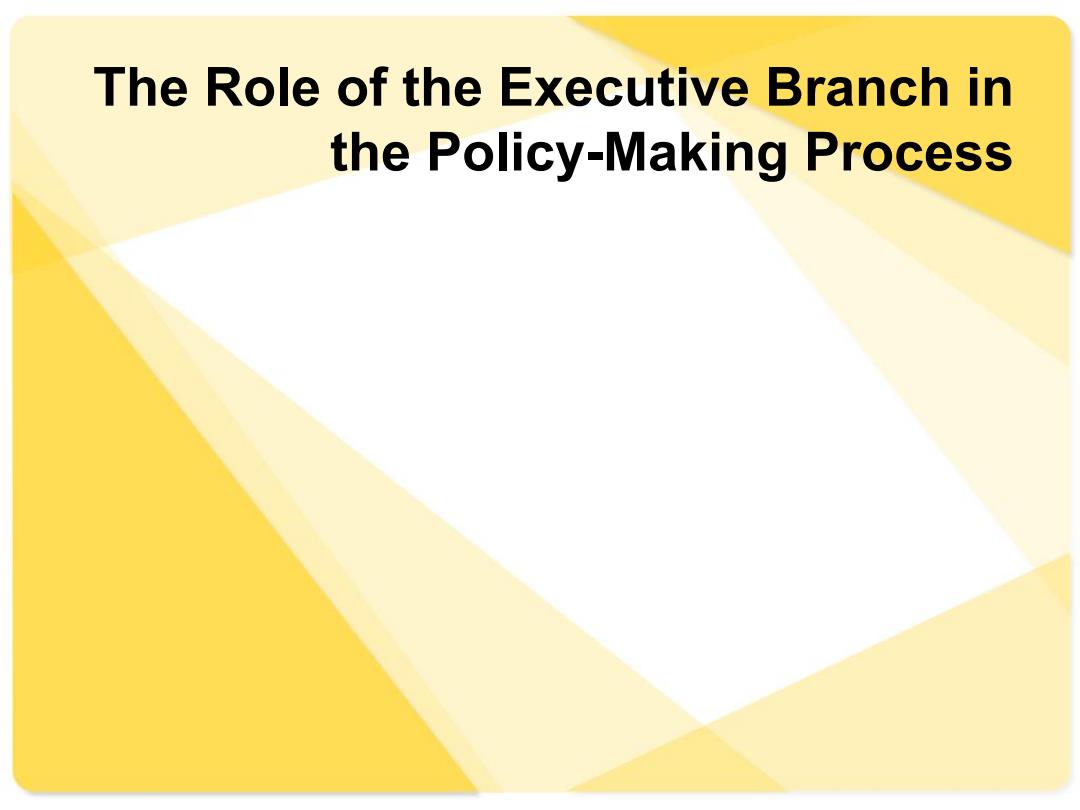
The Role of the Executive Branch in the Policy-Making Process
The Role of the Executive Branch in the Policy-Making Process
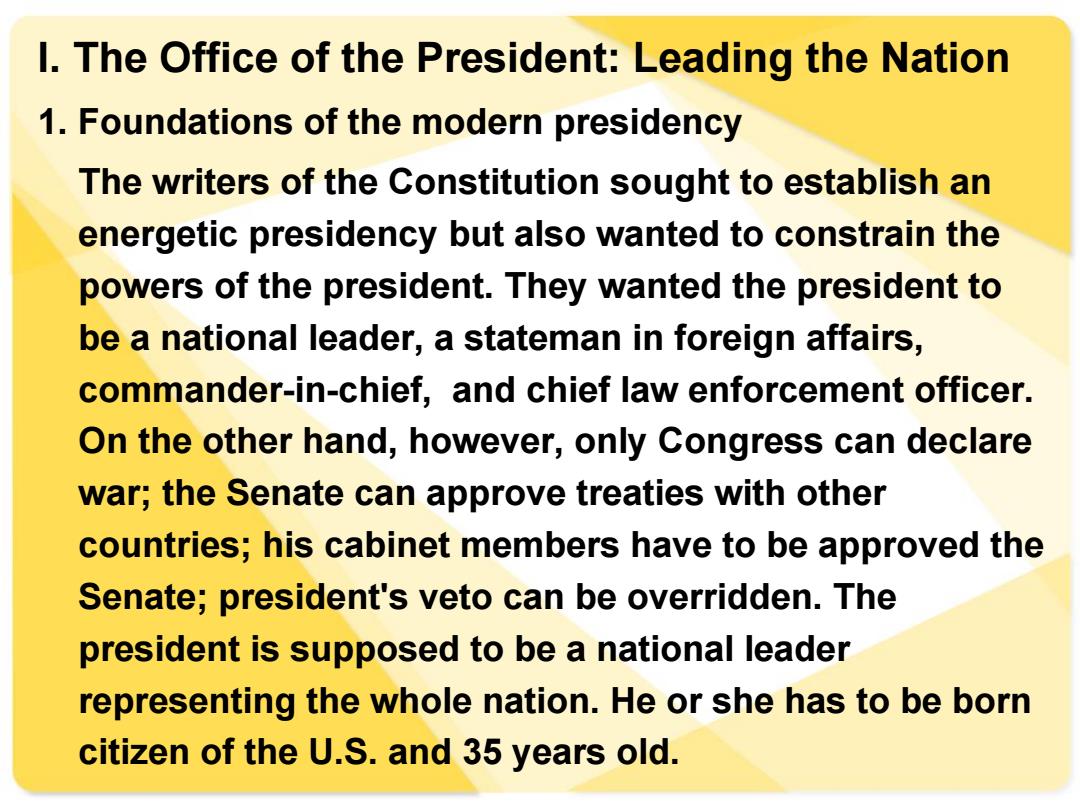
I.The Office of the President:Leading the Nation 1.Foundations of the modern presidency The writers of the Constitution sought to establish an energetic presidency but also wanted to constrain the powers of the president.They wanted the president to be a national leader,a stateman in foreign affairs, commander-in-chief,and chief law enforcement officer. On the other hand,however,only Congress can declare war;the Senate can approve treaties with other countries;his cabinet members have to be approved the Senate;president's veto can be overridden.The president is supposed to be a national leader representing the whole nation.He or she has to be born citizen of the U.S.and 35 years old
I. The Office of the President: Leading the Nation 1. Foundations of the modern presidency The writers of the Constitution sought to establish an energetic presidency but also wanted to constrain the powers of the president. They wanted the president to be a national leader, a stateman in foreign affairs, commander-in-chief, and chief law enforcement officer. On the other hand, however, only Congress can declare war; the Senate can approve treaties with other countries; his cabinet members have to be approved the Senate; president's veto can be overridden. The president is supposed to be a national leader representing the whole nation. He or she has to be born citizen of the U.S. and 35 years old
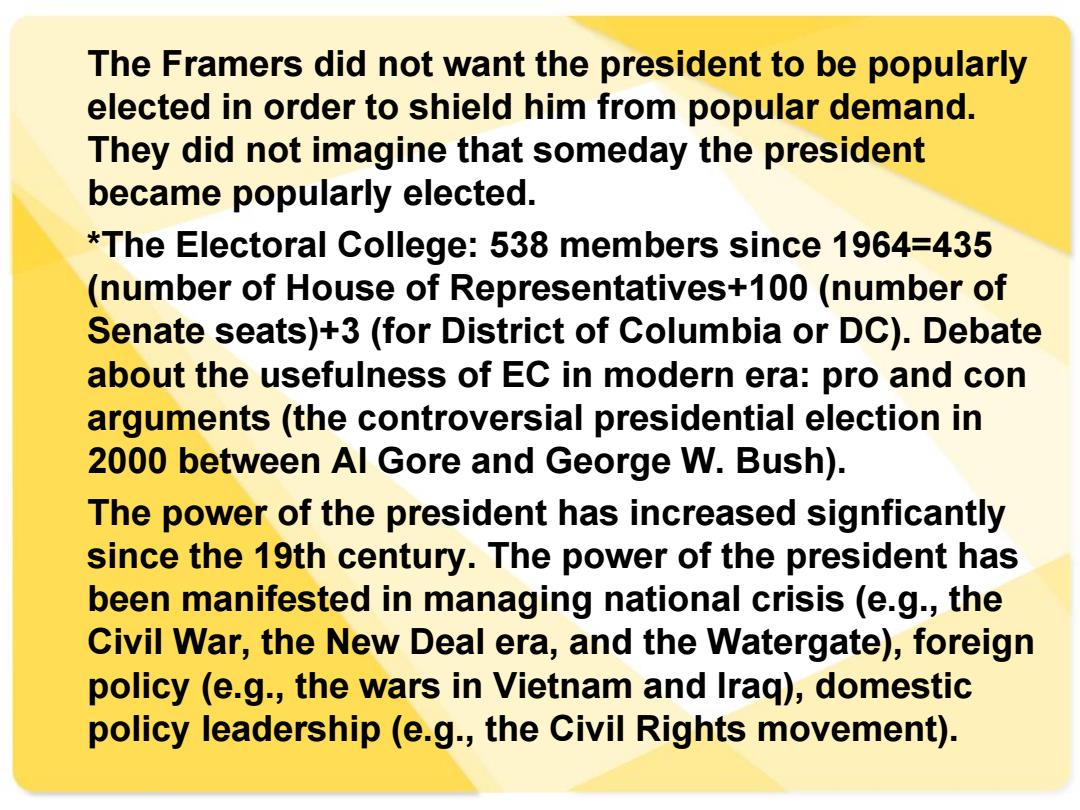
The Framers did not want the president to be popularly elected in order to shield him from popular demand. They did not imagine that someday the president became popularly elected. *The Electoral College:538 members since 1964=435 (number of House of Representatives+100(number of Senate seats)+3(for District of Columbia or DC).Debate about the usefulness of EC in modern era:pro and con arguments(the controversial presidential election in 2000 between Al Gore and George W.Bush). The power of the president has increased signficantly since the 19th century.The power of the president has been manifested in managing national crisis (e.g.,the Civil War,the New Deal era,and the Watergate),foreign policy (e.g.,the wars in Vietnam and Iraq),domestic policy leadership (e.g.,the Civil Rights movement)
The Framers did not want the president to be popularly elected in order to shield him from popular demand. They did not imagine that someday the president became popularly elected. *The Electoral College: 538 members since 1964=435 (number of House of Representatives+100 (number of Senate seats)+3 (for District of Columbia or DC). Debate about the usefulness of EC in modern era: pro and con arguments (the controversial presidential election in 2000 between Al Gore and George W. Bush). The power of the president has increased signficantly since the 19th century. The power of the president has been manifested in managing national crisis (e.g., the Civil War, the New Deal era, and the Watergate), foreign policy (e.g., the wars in Vietnam and Iraq), domestic policy leadership (e.g., the Civil Rights movement)
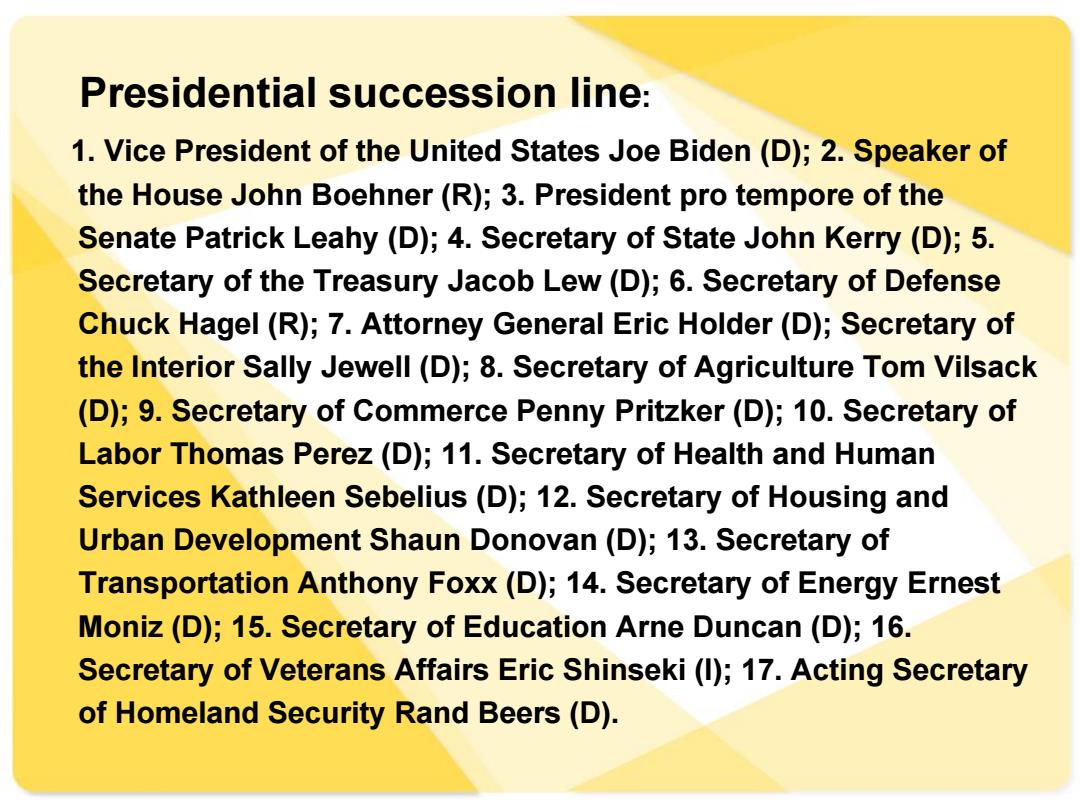
Presidential succession line: 1.Vice President of the United States Joe Biden(D);2.Speaker of the House John Boehner(R);3.President pro tempore of the Senate Patrick Leahy (D);4.Secretary of State John Kerry (D);5. Secretary of the Treasury Jacob Lew(D);6.Secretary of Defense Chuck Hagel(R);7.Attorney General Eric Holder(D);Secretary of the Interior Sally Jewell(D);8.Secretary of Agriculture Tom Vilsack (D);9.Secretary of Commerce Penny Pritzker(D);10.Secretary of Labor Thomas Perez(D);11.Secretary of Health and Human Services Kathleen Sebelius(D);12.Secretary of Housing and Urban Development Shaun Donovan(D);13.Secretary of Transportation Anthony Foxx(D);14.Secretary of Energy Ernest Moniz(D);15.Secretary of Education Arne Duncan(D);16. Secretary of Veterans Affairs Eric Shinseki(I);17.Acting Secretary of Homeland Security Rand Beers(D)
Presidential succession line: 1. Vice President of the United States Joe Biden (D); 2. Speaker of the House John Boehner (R); 3. President pro tempore of the Senate Patrick Leahy (D); 4. Secretary of State John Kerry (D); 5. Secretary of the Treasury Jacob Lew (D); 6. Secretary of Defense Chuck Hagel (R); 7. Attorney General Eric Holder (D); Secretary of the Interior Sally Jewell (D); 8. Secretary of Agriculture Tom Vilsack (D); 9. Secretary of Commerce Penny Pritzker (D); 10. Secretary of Labor Thomas Perez (D); 11. Secretary of Health and Human Services Kathleen Sebelius (D); 12. Secretary of Housing and Urban Development Shaun Donovan (D); 13. Secretary of Transportation Anthony Foxx (D); 14. Secretary of Energy Ernest Moniz (D); 15. Secretary of Education Arne Duncan (D); 16. Secretary of Veterans Affairs Eric Shinseki (I); 17. Acting Secretary of Homeland Security Rand Beers (D)
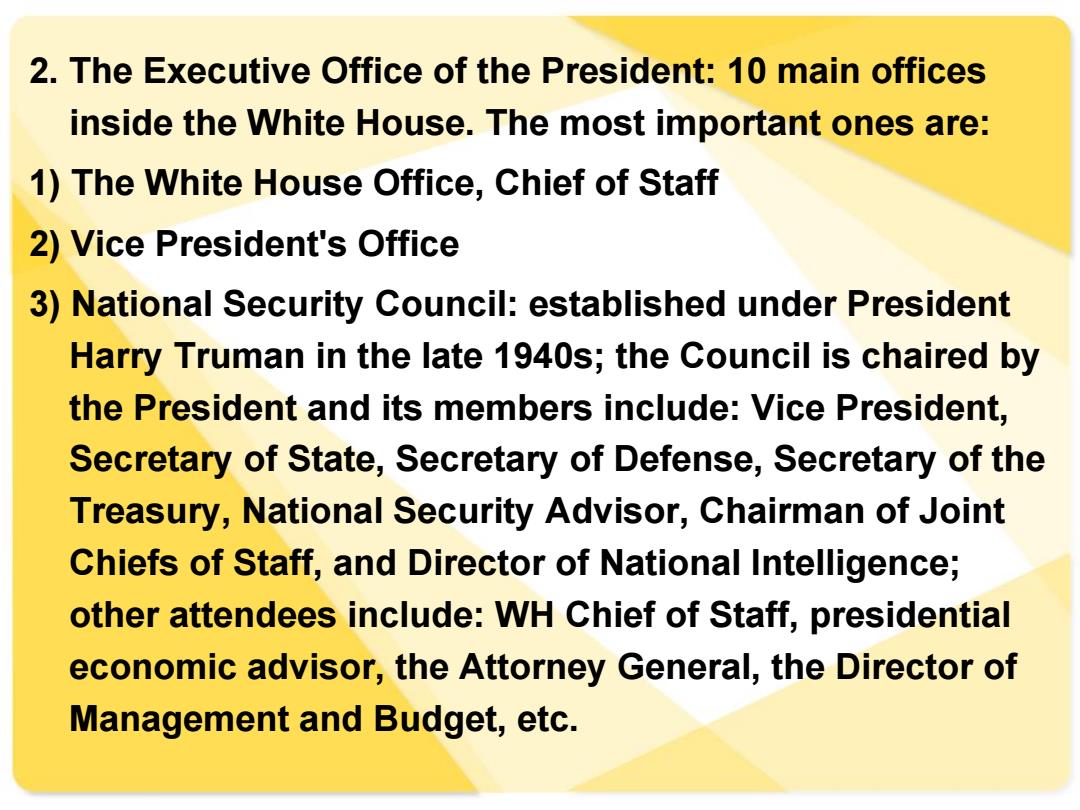
2.The Executive Office of the President:10 main offices inside the White House.The most important ones are: 1)The White House Office,Chief of Staff 2)Vice President's Office 3)National Security Council:established under President Harry Truman in the late 1940s;the Council is chaired by the President and its members include:Vice President, Secretary of State,Secretary of Defense,Secretary of the Treasury,National Security Advisor,Chairman of Joint Chiefs of Staff,and Director of National Intelligence; other attendees include:WH Chief of Staff,presidential economic advisor,the Attorney General,the Director of Management and Budget,etc
2. The Executive Office of the President: 10 main offices inside the White House. The most important ones are: 1) The White House Office, Chief of Staff 2) Vice President's Office 3) National Security Council: established under President Harry Truman in the late 1940s; the Council is chaired by the President and its members include: Vice President, Secretary of State, Secretary of Defense, Secretary of the Treasury, National Security Advisor, Chairman of Joint Chiefs of Staff, and Director of National Intelligence; other attendees include: WH Chief of Staff, presidential economic advisor, the Attorney General, the Director of Management and Budget, etc
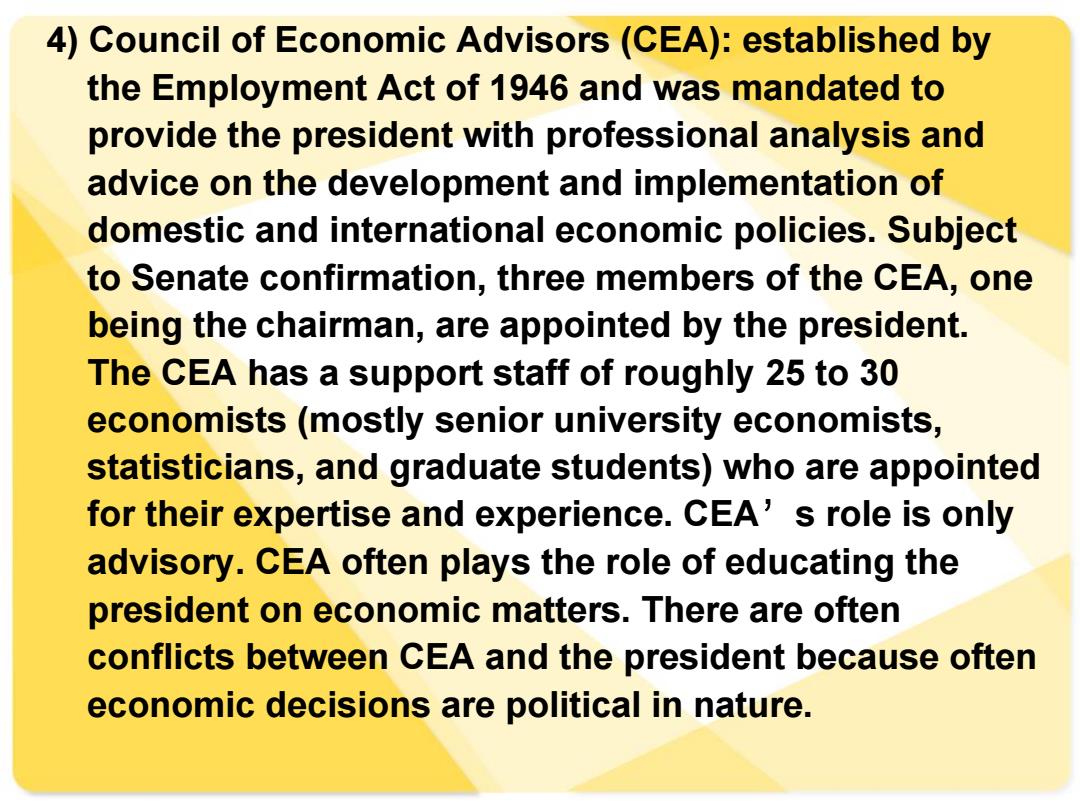
4)Council of Economic Advisors(CEA):established by the Employment Act of 1946 and was mandated to provide the president with professional analysis and advice on the development and implementation of domestic and international economic policies.Subject to Senate confirmation,three members of the CEA,one being the chairman,are appointed by the president. The CEA has a support staff of roughly 25 to 30 economists(mostly senior university economists, statisticians,and graduate students)who are appointed for their expertise and experience.CEA's role is only advisory.CEA often plays the role of educating the president on economic matters.There are often conflicts between CEA and the president because often economic decisions are political in nature
4) Council of Economic Advisors (CEA): established by the Employment Act of 1946 and was mandated to provide the president with professional analysis and advice on the development and implementation of domestic and international economic policies. Subject to Senate confirmation, three members of the CEA, one being the chairman, are appointed by the president. The CEA has a support staff of roughly 25 to 30 economists (mostly senior university economists, statisticians, and graduate students) who are appointed for their expertise and experience. CEA’s role is only advisory. CEA often plays the role of educating the president on economic matters. There are often conflicts between CEA and the president because often economic decisions are political in nature
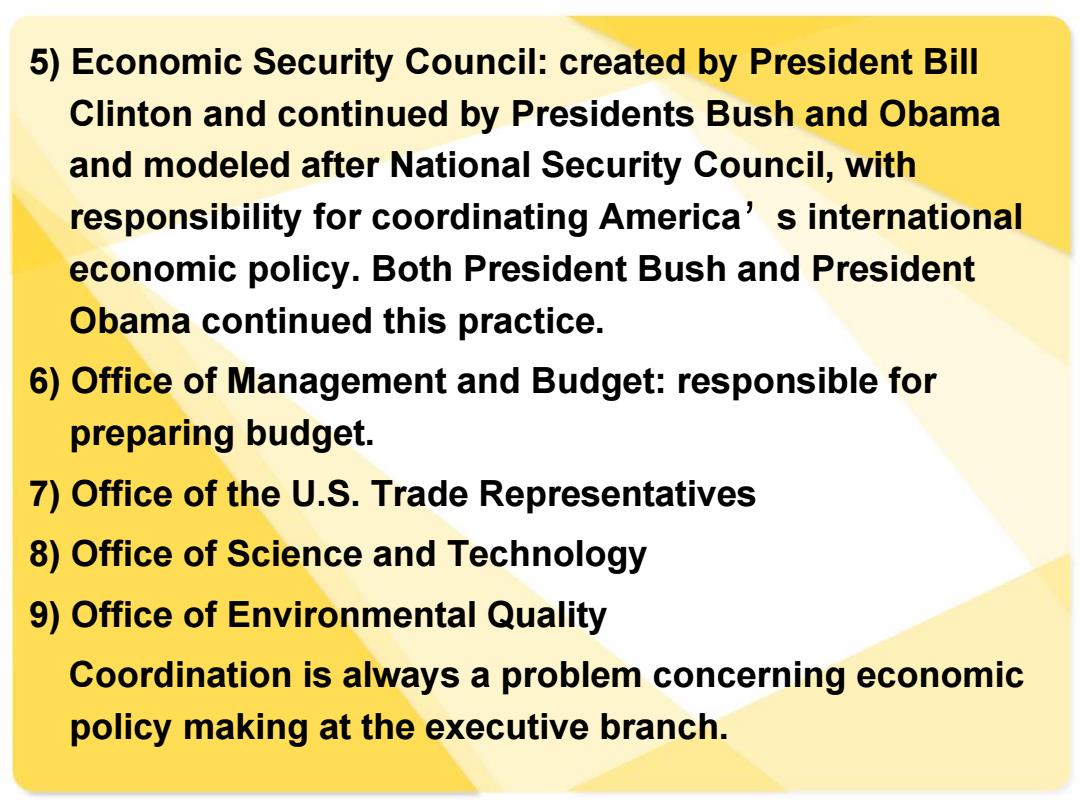
5)Economic Security Council:created by President Bill Clinton and continued by Presidents Bush and Obama and modeled after National Security Council,with responsibility for coordinating America's international economic policy.Both President Bush and President Obama continued this practice. 6)Office of Management and Budget:responsible for preparing budget. 7)Office of the U.S.Trade Representatives 8)Office of Science and Technology 9)Office of Environmental Quality Coordination is always a problem concerning economic policy making at the executive branch
5) Economic Security Council: created by President Bill Clinton and continued by Presidents Bush and Obama and modeled after National Security Council, with responsibility for coordinating America’s international economic policy. Both President Bush and President Obama continued this practice. 6) Office of Management and Budget: responsible for preparing budget. 7) Office of the U.S. Trade Representatives 8) Office of Science and Technology 9) Office of Environmental Quality Coordination is always a problem concerning economic policy making at the executive branch
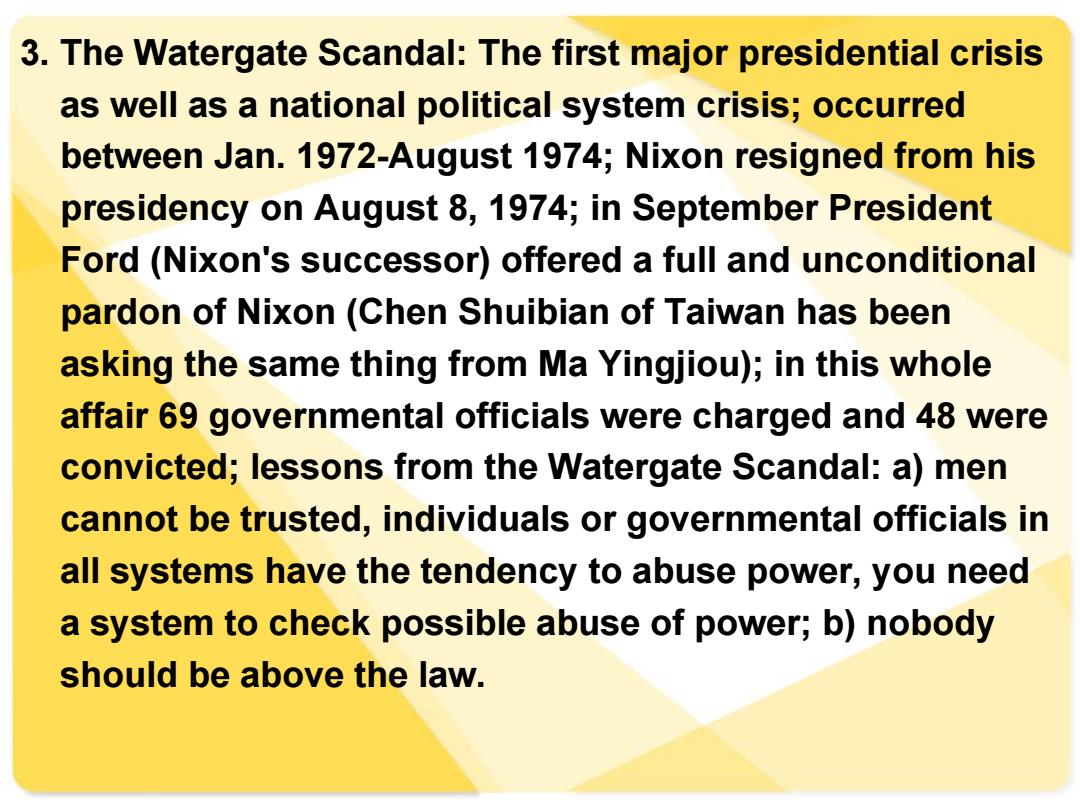
3.The Watergate Scandal:The first major presidential crisis as well as a national political system crisis;occurred between Jan.1972-August 1974;Nixon resigned from his presidency on August 8,1974;in September President Ford (Nixon's successor)offered a full and unconditional pardon of Nixon(Chen Shuibian of Taiwan has been asking the same thing from Ma Yingjiou);in this whole affair 69 governmental officials were charged and 48 were convicted;lessons from the Watergate Scandal:a)men cannot be trusted,individuals or governmental officials s in all systems have the tendency to abuse power,you need a system to check possible abuse of power;b)nobody should be above the law
3. The Watergate Scandal: The first major presidential crisis as well as a national political system crisis; occurred between Jan. 1972-August 1974; Nixon resigned from his presidency on August 8, 1974; in September President Ford (Nixon's successor) offered a full and unconditional pardon of Nixon (Chen Shuibian of Taiwan has been asking the same thing from Ma Yingjiou); in this whole affair 69 governmental officials were charged and 48 were convicted; lessons from the Watergate Scandal: a) men cannot be trusted, individuals or governmental officials in all systems have the tendency to abuse power, you need a system to check possible abuse of power; b) nobody should be above the law
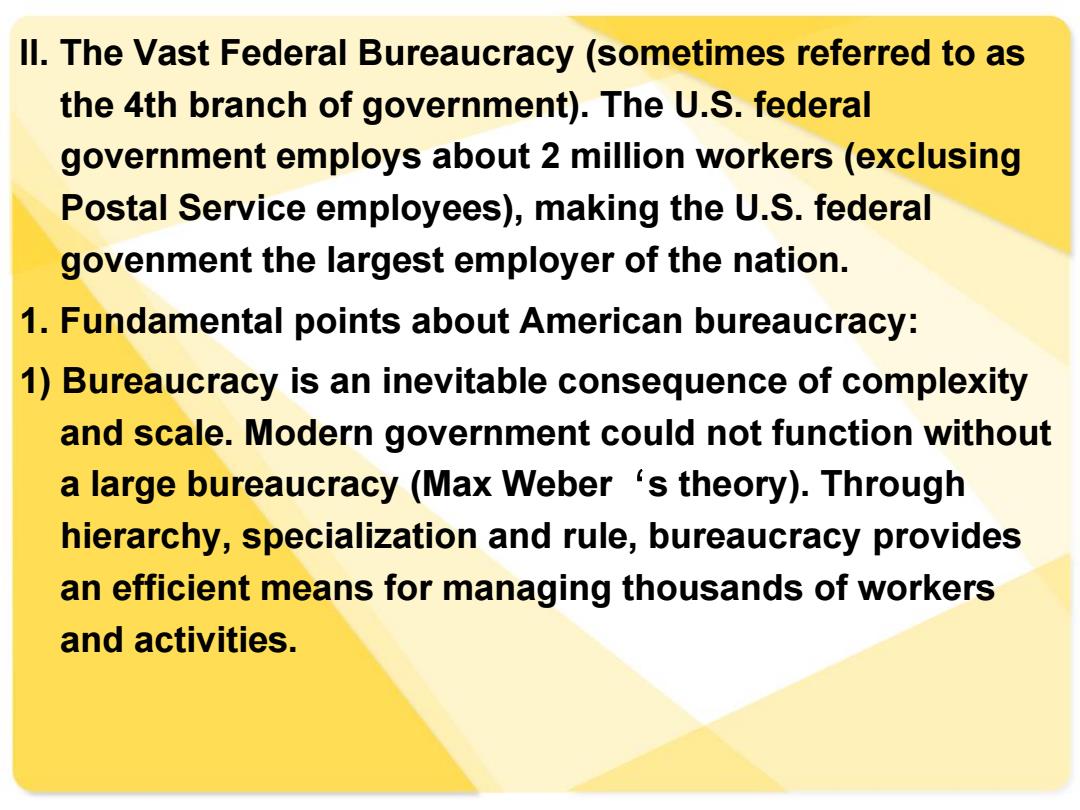
ll.The Vast Federal Bureaucracy (sometimes referred to as the 4th branch of government).The U.S.federal government employs about 2 million workers(exclusing Postal Service employees),making the U.S.federal govenment the largest employer of the nation. 1.Fundamental points about American bureaucracy: 1)Bureaucracy is an inevitable consequence of complexity and scale.Modern government could not function without a large bureaucracy(Max Weber 's theory).Through hierarchy,specialization and rule,bureaucracy provides an efficient means for managing thousands of workers and activities
II. The Vast Federal Bureaucracy (sometimes referred to as the 4th branch of government). The U.S. federal government employs about 2 million workers (exclusing Postal Service employees), making the U.S. federal govenment the largest employer of the nation. 1. Fundamental points about American bureaucracy: 1) Bureaucracy is an inevitable consequence of complexity and scale. Modern government could not function without a large bureaucracy (Max Weber‘s theory). Through hierarchy, specialization and rule, bureaucracy provides an efficient means for managing thousands of workers and activities
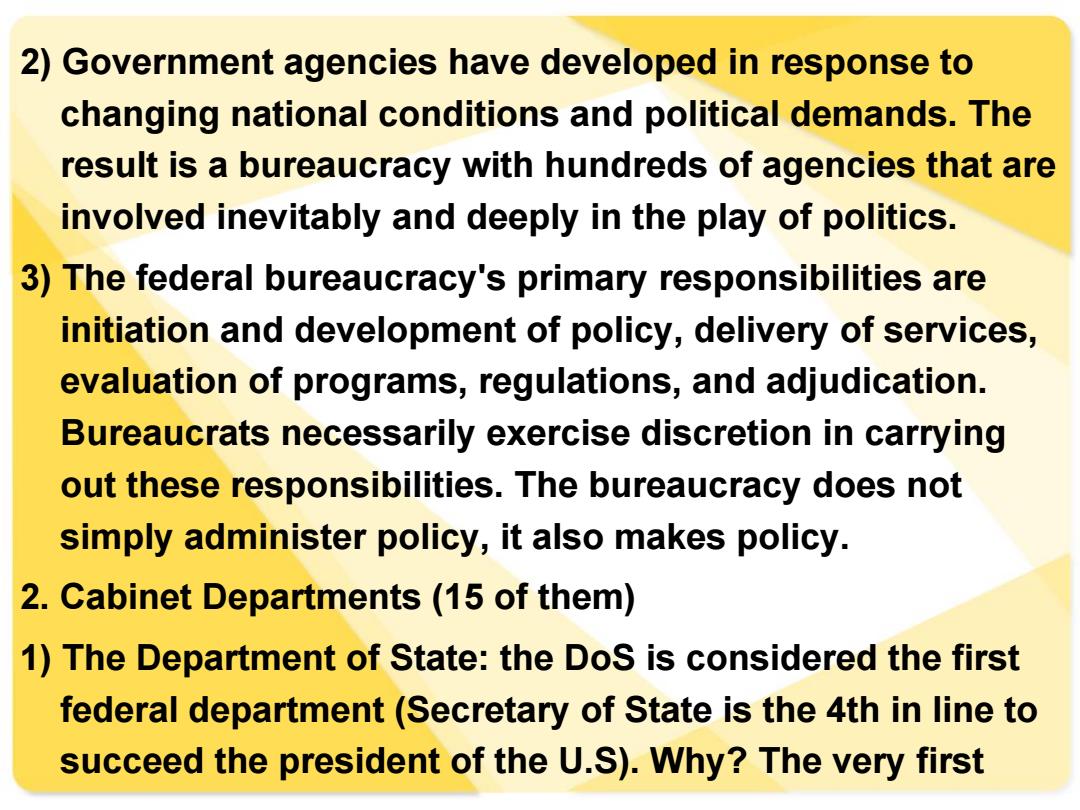
2)Government agencies have developed in response to changing national conditions and political demands.The result is a bureaucracy with hundreds of agencies that are involved inevitably and deeply in the play of politics. 3)The federal bureaucracy's primary responsibilities are initiation and development of policy,delivery of services, evaluation of programs,regulations,and adjudication. Bureaucrats necessarily exercise discretion in carrying out these responsibilities.The bureaucracy does not simply administer policy,it also makes policy. 2.Cabinet Departments(15 of them) 1)The Department of State:the Dos is considered the first federal department (Secretary of State is the 4th in line to succeed the president of the U.S).Why?The very first
2) Government agencies have developed in response to changing national conditions and political demands. The result is a bureaucracy with hundreds of agencies that are involved inevitably and deeply in the play of politics. 3) The federal bureaucracy's primary responsibilities are initiation and development of policy, delivery of services, evaluation of programs, regulations, and adjudication. Bureaucrats necessarily exercise discretion in carrying out these responsibilities. The bureaucracy does not simply administer policy, it also makes policy. 2. Cabinet Departments (15 of them) 1) The Department of State: the DoS is considered the first federal department (Secretary of State is the 4th in line to succeed the president of the U.S). Why? The very first